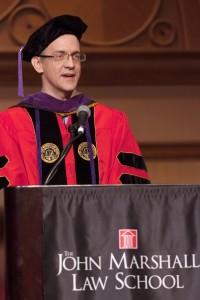Robert Olmstead, class valedictorian, delivered this address at the Jan. 15, 2012, commencement of The John Marshall Law School:
I’ve been asked to talk about the law school experience, but before I do, on behalf of all the graduates, I want to thank those of you here today who did the real heavy lifting of law school. You are the spouses, the parents, the roommates or significant others who put up with our perpetual absences, provided financial or emotional support, and generally did the real work of the world while we had our noses stuck in a book. Every graduate is here today because of you. And I mean that literally.
In my case, it was my beautiful wife, Marni. Marni became a law school widow 17 days after we were married and during law school she gave birth to two children, raised them, worked full time, provided the lion’s share of the family income, and battled an employer who forced her to return to work a week after giving birth to our second child. Most importantly, she always reminded me that what is most important is not law school, but family. Thank you, Marni. I love you.
In addition to my wife, I have also been blessed with another perspective of law school as provided by a past hobby of mine: producing independent horror films. As every graduate here today knows, law school is very much like a horror film.
We all, like the dim-witted teenager of those movies, left the warmth and comfort of our homes to check out that noise in the dark forest known as law school. And like the protagonists in “Nightmare on Elm Street,” we seldom slept. The most striking similarity between law school and a horror film is that both require a healthy suspension of disbelief.
What I mean by that is, during law school, the rules and statutes come so furiously and quickly, that it is necessary to put aside your natural inclination to ask “Is that really the way it ought to be?” and instead focus on learning the way it is.
Now, in a horror movie, if you don’t suspend your disbelief that the villain could possibly get back up, you will not enjoy the show, and you will have 10 or 12 fewer dollars.
In law school, if you spend an inordinate amount of time asking “Is this the way it should be?” every time you hear a legal absurdity, you will inevitably miss the next 12 absurdities the professor is telling you to memorize. If this pattern continues, you find yourself flunking out, you will not enjoy the show, and you will have 30,000 fewer dollars.
So as a matter of self-defense, we prioritize. It works something like this.
Year one: The Contracts professor says, “A promise without consideration is unenforceable.” The student writes or thinks “Really? So no one has to keep their promises? Really? Is this what law school teaches us? Do I really want to be a lawyer?”
Also in the first year, the Torts professor says, “In Summers v. Tice, two hunters shoot at a deer, but one misses, wounding a third person. The evidence cannot establish which hunter actually shot the third person, so both are held liable.” The law student thinks or writes “REALLY!? Really? I’m out 50 grand because I went hunting with Dick Cheney? Is this the way it should be? Do I really want to be a lawyer?”
But, as I said, while the student was ruminating on these things, he or she has missed the next 12 rules of law and has to play catch up. So the student learns very quickly to abbreviate not only the black letter law, but his sense of incredulity.
By year two, when the Constitutional Law professor says, “The 14th Amendment prohibits states from abridging the privileges and immunities of U.S. citizens,” the student writes “14A = P & I.” The professor continues: “The Slaughterhouse cases, however, greatly curtailed the power of this clause.” The student writes merely “P & I clause – NEVERMIND. Parenthesis W.T.F. Question mark. Close paren.”
By year three, any attempt at commentary or social analysis is gone. Honestly, professors, if you want to have some good fun, just get a class full of law students in their last semester. You could pretty much just make stuff up and we would buy it. We might even believe corporations have the same free speech rights as people.
Now, if I seem to be derisive of law or law school, I apologize. I sincerely believe law is one of mankind’s greatest inventions. Neither do I think that we, as students, were wrong to abbreviate our incredulity when confronted with a law we didn’t agree with. It was necessary to accomplish the task at hand.
But now, the horror movie is over. It is not only OK to end the suspension of disbelief, but imperative that we do so.
Scott Turow put it much better in his book 1L in quoting one of his Harvard professors. The professor said, “You’ll find there’s a premium placed on mastering the rules. … But in learning rules, don’t feel as if you’ve got to forsake a sense of moral scrutiny. The law in almost all its phases is a reflection of competing value systems. Don’t get your heads turned around to the point that you feel because you’re learning a rule, you’ve necessarily taken on the values that produced the rule in the first place.”
Another Chicago attorney I know told me that, invariably, the happiest and most well-adjusted lawyers he knew were those who knew what they wanted to do before entering law school. They enrolled, earned their law degrees and then went about accomplishing that goal. In other words, they used the law as a tool; they did not become an instrument of the law.
I think that observation is correct, but I don’t think that all is lost for those of us who still do not quite know what we want to do with our law degrees. The point, I think, is, to not gauge our compass to any star sighted in the last three years (or in my case 4 and a half), but to turn on the lights, walk out of the movie theater, blink our eyes in the bright sunshine and allow our disbelief, our common sense, our perspective, our sense of right and wrong that guided us before law school, to guide us now, and to go out and embrace what we held dear then, as the same thing we hold dear now, and to use the law to elevate both ourselves and what we value most.
Thank you.


